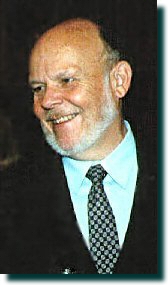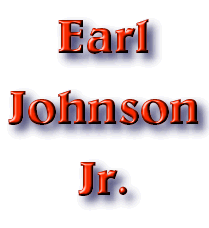

Law Professor, Jurist
Earl Johnson Jr., a Norwegian-American, served as a notable appellate court justice from 1982-2007. In 1994, the late Bernard Witkin, long recognized as the preeminent authority on California law, wrote of Johnson's work as an appellate jurist:
"I have been evaluating California opinions and writing about California law for over 50 years....Justice Johnson's range of legal knowledge, his understanding of the processes of appellate review, and his skillful and articulate crafting of opinions, are unsurpassed by any sitting member of the Court, or indeed, by any distinguished occupants of the appellate bench of past decades. A Johnson opinion is a model of careful organization, clear and convincing reasoning, and stimulating style."
Witkin's appraisal was based on the 500 published opinions (along with several thousand unpublished opinions) Johnson had authored in the preceeding 15 years. Others have given Johnson equally high marks.
Before he was appointed to the appellate bench, the Judicial Nominees Evaluation Commission gave Johnson an "Exceptionally Well-Qualified" rating. In the intervening years, he has also earned "Appellate Justice of the Year" and "Outstanding Judicial Achievements" awards for his performance on the court. In 1998, the Los Angeles Association of Deputy District Attorneys unanimously endorsed his retention on the appellate court because they found during his years on the court he has "proved to be an outstanding jurist" whose "standards are above reproach."
Johnson brought an unusually rich mix of experience to the appellate bench. In the 21 years before his appointment, he served as a naval offcer, federal prosecutor, legal aid lawyer, a government offcial heading the federal program providing civil legal services to poor people, a law professor at USC, a member of the L.A. County Regional Planning Commission, and the author of several books and articles about trial practice, organized crime, legal aid, and the administration of justice.
Johnson was born and raised in Watertown, South Dakota, the son of a travelling salesman of Norwegian heritage and a former school teacher. Both had a strong work ethic they instilled in their son. Starting at age 12, Johnson worked summers picking potatoes, delivering newspapers, as a waiter, grocery bag boy, life guard and eventually assistant manager of a YMCA summer camp.
He received his B.A. with Departmental Honors in Economics from Northwestern University which he attended on an N.R.O.T.C. scholarship. While there, he was student body president, a varsity debater, and member of the Deru honorary society.
He then served three years active duty as a naval officer on an aircraft carrier, the U.S.S. Saipan, and on the staff of the Supreme Allied Commander, Atlantic.
Upon returning from the service, he earned his Juris Doctorate degree from the University of Chicago Law School where he was an editor of the University of Chicago Law Review while working half-time as a research assistant at the American Bar Foundation. He later received an L.L.M. in Criminal Law from Northwestern University which he attended as a Ford Foundation Fellow and wrote a dissertation on the subject of organized crime.
Upon graduation, Johnson worked for several years as a federal prosecutor with the Organized Crime and Racketeering Section (OCR) of the U.S. Department of Justice. As a trial attorney and special assistant U.S. attorney, he conducted grand jury investigations, tried cases and argued appeals in various parts of the country.
He ultimately started the OCR Section's field office ("strike force") in Las Vegas. He then became a legal aid lawyer, accepting an offer as deputy director of a new 10-office, 30-attorney neighborhood lawyer program located in Washington, D.C. This experimental project had offices throughout that city's ghettoes representing poor people in civil cases.
Later, he was appointed the first deputy director, and then the second director, of the national OEO Legal Services Program, which also helped poor people with their civil legal problems. During his tenure, this program grew to 850 offices in 250 communities staffed by 2,000 lawyers handling nearly a million cases a year.
After leaving government, Johnson became a professor of law at the University of Southern California where he taught evidence, trial practice, law and poverty, and professional responsibility. While at U.S.C., he also set up a clinical program placing students in DA's offices and legal aid offices, headed a research program on dispute resolution for seven years, wrote a set of books on trial practice, handled appellate litigation on a pro bono basis, won the Justin Dart Award for Academic Innovation, was a visiting scholar at the University of Florence in Italy and at the European University Institute, and a State Department lecturer in Africa.
While a law professor, he also served for a year-and-a half as one of five part-time members of the L.A. County Regional Planning Commission making land use and zoning decisions in the unincorporated areas of the county. He also devoted several years to the executive committee of the National Resource Center for Consumers of Legal Services, which coordinates elforts to make low-cost legal services available to the middle class.
In 1977, the California State Bar gave him its first annual Loren Miller Legal Services Award and in 1978 KNX Radio named him Southern California Citizen of the Week. Johnson has been listed in Who's Who in America since 1978 and Who's Who in the World since 1980.
Since his appointment to the court in 1982, Johnson has served several years on the Judicial Ethics Committee and the Appellate Courts Committee of the California Judges Association. He also was a member of the board of the Continuing Judicial Studies Program that provides ongoing education for experienced judges.
In recent years, he chaired the California State Bar's Access to Justice Working Group, and currently is a member of the California Access to Justice Commission. He was the founding President of the Consortium for the National Equal Justice Library (located at American University in Washington, D.C.) and remains on the library's executive committee.
Johnson is a member of the law school honorary society, Order of the Coif. He also is a Fellow of the American Bar Foundation and serves on the Advisory Research Committee of that organization and on the editorial board of its journal.
In 1990, the California State Bar named its new fellowship program for recent graduates "The Earl Johnson Community Lawyer Fellows." During his career, Johnson has authored or co-authored sixteen books including Justice and Reform (1974, 1978), Toward Equal Justice (1975, 1981), Dispute Resolution in America (1984), California Trial Guide (8 vols. 1986), California Family Law Trial Guide (4 vols. 1992), and Federal Trial Guide (5 vols. 1992), as well as more than 40 articles including a series on "Organized Crime: Challenge to the American Legal System," published in The Journal of Criminal Law, Criminology and Police Science (1962-63), "A Conservative Rationale for the OEO Legal Services Program," published in the University of West Virginia Law Review (1968), and "Toward a Responsive Justice System," published by the National Center for State Courts (1978).
Johnson received the "Appellate Judge of the Year" Award from the Consumer Attorneys of California in 2003," the Beacon of Justice" Award from Los Angeles County Law Library in 2006, and the "Outstanding Jurist" Award from the Los Angeles County Bar Association in 2007.
Johnson is married to Barbara Y. Johnson, a former Los Angeles County deputy district attorney and chief assistant attorney general in the California Department of Justice who is now an independent mediator and fact finder, and has three children -- Kelly, a clinical psychologist, Eric, a television executive, and Agaarn, a college student.
Johnson's hobbies include tennis, reading mysteries, travel, photography, video-photography, watching college and professional sports, and writing.
For a news article on the retirement of Johnson in 2007, CLICK HERE
CLICK BELOW TO READ A LETTER IN WHICH JUSTICE JOHNSON DISCUSSES....
CLICK BELOW TO RETURN TO THE...

